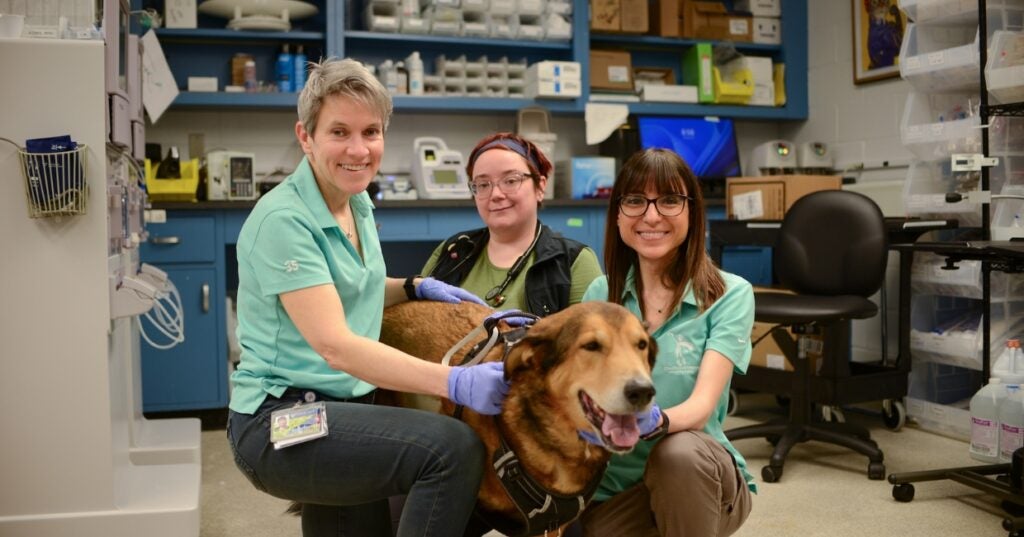New Study Identifies Promising Inhibitor Combination for Hard-to-Treat Leukemia Subtypes
Assistant Professor of Biomedical Sciences M. Andrés Blanco, PhD, from the University of Pennsylvania’s School of Veterinary Medicine (Penn Vet) and investigators from the Universities of Oxford, Helsinki, and California at San Diego identified a promising strategy to overcome treatment resistance in acute myeloid luekemia (AML), one of the most aggressive forms of blood cancer.
AML occurs when bone marrow produces substantial amounts of abnormal white blood cells. According to the American Cancer Society, AML accounts for one-third of leukemias in adults, and it can spread rapidly through the body. Differentiation therapy, a cancer treatment that prompts cancer cells to become less aggressive thereby reducing or stopping their proliferation, is curative for the acute promyelocytic leukemia (APL) subtype of AML, but not for the other eight non-APL subtypes (FAB classification).
According to the study published in Nature, Oxford University’s Amir Hosseini, PhD, et al., utilized a high-throughput screening strategy to identify small molecule inhibitors that synergize with inhibitors of the histone demethylase LSD1 to induce terminal differentiation of acute myeloid leukemia cells. The authors found that combinatorial inhibition glycogen synthase kinase 3 (GSK-3) and LSD1 synergistically induces terminal differentiation in non-APL AML cell lines and patient samples.
Mechanistically, it was found that, B-catenin – which is stabilized by GSK-3 inhibition – surprisingly does not activate the WNT pathway but instead complexes with alternative transcription factors to conduct a pro-differentiation interferon response that is initiated by LSD1 inhibition. In pre-clinical models, combinatorial treatment with LSD1 and GSK-3 inhibitors dramatically extended lifespan of AMLs with DNMT3A mutations. As a result of these findings, the researchers nominated this novel inhibitor combination for the treatment of human non-APL subtypes of AML.
“These findings present a potential new avenue for differentiation therapy in AML subtypes that have resisted such approaches,” said Blanco, corresponding author of the study. “This study provides a compelling rationale for testing dual LSD1 and GSK-3 inhibition as a therapeutic technique for humans with non-APL AML subtypes, offering hope for better outcomes with this disease.”
Related News

Penn Vet’s Wildlife Futures Seek to Unravel the Mystery of the Disappearing Barn Owl
Penn Vet’s Wildlife Futures Program and the Pennsylvania Game Commission (PGC) have been engaged in a collaborative effort to identify the causes of these owls’ decline and any actions that…

Penn Vet’s Annual Research Retreat Calls for the Power of Synergy in Challenging Times
Noting the challenges ahead, but celebrating the many breakthroughs at hand, the University of Pennsylvania School of Veterinary Medicine (Penn Vet) community gathered for their 31st annual Research Retreat held…

Dogs with cancer are helping save lives—both canine and human (link is external)
The Comparative Immunotherapy Program led by Penn Vet’s Nicola Mason is redefining how therapies are developed and tested—uniting human and veterinary medicine to move promising immunotherapies forward.
About Penn Vet
Ranked among the top ten veterinary schools worldwide, the University of Pennsylvania School of Veterinary Medicine (Penn Vet) is a global leader in veterinary education, research, and clinical care. Founded in 1884, Penn Vet is the first veterinary school developed in association with a medical school. The school is a proud member of the One Health initiative, linking human, animal, and environmental health.
Penn Vet serves a diverse population of animals at its two campuses, which include extensive diagnostic and research laboratories. Ryan Hospital in Philadelphia provides care for dogs, cats, and other domestic/companion animals, handling more than 30,000 patient visits a year. New Bolton Center, Penn Vet’s large-animal hospital on nearly 700 acres in rural Kennett Square, PA, cares for horses and livestock/farm animals. The hospital handles more than 6,300 patient visits a year, while our Field Services have gone out on more than 5,500 farm service calls, treating some 22,400 patients at local farms. In addition, New Bolton Center’s campus includes a swine center, working dairy, and poultry unit that provide valuable research for the agriculture industry.

